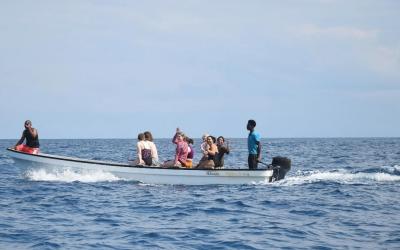**********This program is cancelled for Summer 2025***********
This program is both a much-needed immersion experience for students to learn language within the culture and so accelerates learning time while expanding breadth of language experience. At the same time, it allows students to do a year's worth of language credits in a relatively short time, shortening time to more levels of the language and/or graduation while giving chance for research in Swahili Language and East Africa as a whole. Site will be an immersive language & cultural experience for Swahili learners and will utilize local experienced foreign-language instructors to teach Swahili at different levels of the students while students live in the community.
State University of Zanzibar (SUZA), Stone Town, Tanzania Zanzibar is a tropical island just 50 miles from the coast of Tanzania in East Africa. It is best considered as an international melting pot—having over the past two thousand years drawn people from the Middle East, India, and mainland Africa in addition to having extensive contact with China, Europe, and the United States. The monsoon winds have long linked this small island to the rest of the Indian Ocean world helping to carry new people, religions, ideas, and leading to an international vibrancy. Being part of such a vast geography of networks meant that Zanzibar has long been a place of cultural diffusion and mixing. It continues to be a place where new ideas and practices are introduced, adopted, and adapted. Stone Town is a UNESCO World Heritage site, full of narrow alleys and labyrinth pathways to explore and get lost in. Walking the streets of historic Stone Town today, it is not unusual to find a woman covered from head to toe in black garment called a buibui, an Indian woman dressed in a sari, and a European tourist walking down the same narrow street. It is this diversity that gives Zanzibar such energy and provides students such a rich culture to come to know.
Zanzibar has a population of roughly 600,000 people, of which 30% live in the capital city of Zanzibar town. Outside of Zanzibar Town, the island is largely rural and involved in the cultivation of food and spices such as cloves, cardamom, vanilla, and pepper. The island is about 50 miles wide and 25 miles long, and most residents are Sunni Muslims. During the months of July and August, Zanzibar’s temperatures are mild and typically range from 70-85 degrees and consist of sunny days with clear blue skies. Although Zanzibar is an international travel destination, it remains an ideal location to study Swahili and learn about Swahili Coast history and culture. A large majority of residents continue to speak Swahili as their primary language (despite often knowing English, Arabic, and other languages) and Zanzibar is continued to be one of the birthplaces of Swahili. In East Africa, it is often said the island is the best place to learn “proper /standard” or “pure” Swahili.
Excursions include:
Weekend Safari to Mikumi National Park in Mainland Tanzania to experience flora and fauna; day-trip to Jozani forest in Zanzibar; Weekend trip to North Zanzibar for rare turtles sanctuary; Day trip to Prison Island for ancient tortoises and fishing lore; Day trip to the Slave Market & Mangapwani slave chambers for historical purposes; Tour of Stone Town for the historical buildings in Zanzibar


